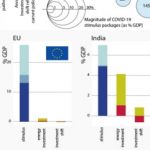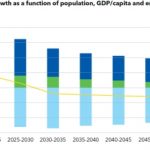Credit rating agencies now clearly recognise that climate change has become its own risk category, explains Tom Sanzillo at IEEFA who summarises his 43-page report. Financially, the coal, oil and gas sectors have served the world for decades. But due to regulatory, legal, economic, financial, political and social concerns, coal is credit negative and oil and gas is no longer positive. Sanzillo’s report charts the gradual erosion of the sector’s … [Read more...]
Half of fossil fuel Methane reduction targets can be met at no net cost. Why isn’t it happening?
We need to cut global methane emissions from fossil fuels by 75% by 2030 to be on target to limit warming to 1.5°C. That equates to 90 Mt of the current total of 120 Mt of annual fossil fuel methane emissions. The IEA says 80 Mt can be avoided through the deployment of known and existing technologies, often at low – or even negative – cost. And the 75% cut needs $170bn in spending to 2030, a very achievable sum given it represents less than 5% of … [Read more...]
Study: universities worldwide are still producing far more graduates for fossil fuels than for clean energy
Universities worldwide still produce more workers for fossil fuels than for renewable energy industries. Roman Vakulchuk and Indra Overland at the Norwegian Institute of International Affairs summarise their new study on the energy transition in global higher education, published by the Energy Research & Social Science journal. The study is based on a review of 18,400 universities in 196 countries. 68% of the world’s energy educational … [Read more...]
Batteries are still getting exponentially cheaper, more efficient: ready to displace half of global fossil fuel demand by 2045?
A new report by RMI says batteries are on the path to replace 175 EJ of fossil fuel demand in the power sector, 86 EJ of fossil fuels from road transport and can put at risk another 23 EJ from shipping and aviation. That equates to a phaseout of half of global fossil fuel demand in the next two decades. Daan Walter, Sam Butler-Sloss and Kingsmill Bond at RMI summarise the findings in six graphs with explanations. Battery sales are growing … [Read more...]
Russia’s war has exposed France and Germany’s energy policy differences. Can it also bring them together?
France and Germany combined account for 45% of EU GDP and 40% of energy consumption. No wonder they are the most influential EU members. But the Russia-induced energy crisis has forced both Paris and Berlin to expose and admit the differences in their national energy strategies, and that has made a search for a unified voice for Europe’s ambitious climate targets much harder to achieve, explain Camille Lafrance and Benjamin Wehrmann at CLEW. … [Read more...]
Nearly half of national climate pledges (NDCs) intend to keep extracting fossil fuels
“Nationally Determined Contributions” (NDCs) are a nation’s published plans to reduce emissions and adapt to the impacts of climate change. Natalie Jones at the IISD, writing for Carbon Brief, summarises her co-authored study that reviews the fossil fuel production element of those NDCs. Nations are obliged to update their NDCs every five years, to give more detail. That added detail is a cause for concern in the latest round of NDCs: there is an … [Read more...]
Evidence of a direct link between Wildfires and Fossil Fuel firms. Can it be used to sue them?
Wildfires are back in the news. The link to rising global temperatures caused by climate change is clear. Mark Specht at the Union of Concerned Scientists summarises their study that, for the first time, puts a number on the level of responsibility attributable to fossil fuel companies. Rising temperatures create a “vapour pressure deficit,” a measure of the power of the air to dry out plants and trees. That leads to an increase in the area … [Read more...]
COP26 and the Glasgow Pact: a summary of achievements, and shortfalls
Experts from around the world summarise their reaction to the outcomes of this year’s UN climate summit, COP26, including the Glasgow Climate Pact agreed by all 197 countries attending the talks. Each expert covers their area of interest: overall targets, greenhouse gas emissions, fossil fuel finance, nature conservation, transportation, cities and buildings, energy sector transitions, science and innovation, and gender equality. The overall … [Read more...]
UNEP 2021 Emissions Gap report: only 11 countries have net-zero targets enshrined in law
Zeke Hausfather at Carbon Brief summarises the UNEP 2021 Emissions Gap report, released last week. It explores the impact of the net-zero emissions pledges of nations, and the “gap” between them and the Paris targets. As COP26 gets started, 136 countries either have some form of commitment to a net-zero target or are considering it. Of those, 49 plus the EU have a firm net-zero commitment. But only 11 countries have targets enshrined in law. … [Read more...]
IEA WEO 2021 message to COP26: 40% of clean energy goals will cut costs
The IEA’s latest World Energy Outlook was published on Wednesday. This year’s WEO-2021 is released earlier than usual to inform COP26 and, for the first time, is available for free to ensure the widest possible audience. Simon Evans at Carbon Brief offers his summary of the 386-page report, quoting relevant numbers and charts. He first points to the new scenario, Net-Zero Emissions by 2050 (NZE), as the IEA’s recognition that this is what … [Read more...]
The standard models overestimate the cost of the low carbon transition
Why have forecasts for new low-carbon energy consistently underestimated their cost reductions? The IEA has, famously, repeatedly had to raise its estimates for solar’s contribution every year since 2009, and now describes it as the “cheapest electricity in history”. Writing for Carbon Brief, Alexandra Poncia at Arup and Paul Drummond and Michael Grubb at University College London explain that standard models focus on “technology-push” policies, … [Read more...]
The energy transition needs some of the $12tn global Covid stimulus. But much less than you think
Governments worldwide have committed over $12tn to recover from the Covid-19 pandemic, spent over the next 5 years. Current estimates say the energy transition needs $1.4tn/year globally between 2020 and 2024 to get us on the path to meet the 1.5oC Paris goal. Clearly, there is an opportunity here. Although support for healthcare systems and the overall economy are the stated priority of governments, much of that $12tn is still not committed. … [Read more...]
“Green” chemical plants that ramp up and down with wind, solar
One solution to variable renewables is to create customers that have no problem with ramping up and down production along with the power. In fact, when the wind and solar is producing too much power for the grid it can be bought very cheaply, making intermittent customers very happy. Jim Conca describes a new design for a Chlor-Alkali Chemical Plant that can “idle” without critical components of the plant degrading – the main reason for a plant … [Read more...]
Methane emissions underestimated by 25-40%, says new study
The methane in our atmosphere comes from natural biogenic (plants, animals) and fossil sources. By telling the difference we can know how much we humans are responsible for. It matters because methane is a potent greenhouse gas, second only to CO2. Previous “bottom-up” estimates came from multiplying the number of sources (livestock, natural gas operations, landfills) by their likely emissions. Robert McSweeney at Carbon Brief describes a new … [Read more...]
Peak Energy by 2030: Efficiency gains will make the Transition affordable
We can’t afford the energy transition? Next time you hear that from someone, perhaps you can show them this. Sverre Alvik at DNV GL explains that, according to their latest Energy Transition Outlook, although annual global energy expenditure will have to increase from $4.6tn in 2017 to $5.5tn in 2050, its share of growing world GDP will almost halve from 3.6% to 1.9%. That’s because continuing energy efficiency gains are making sure that total … [Read more...]















